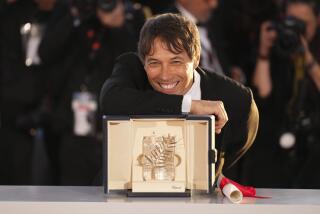‘Pelle’ Conquers Cannes : Barbara Hershey Wins for 2nd Time; Whitaker Gets Prize
- Share via
CANNES, France — Amid signs of a decidedly split jury, the coveted Palme d’Or at the 41st Cannes Film Festival went Monday night to the Danish-Swedish co-production “Pelle the Conqueror” by director Bille August.
Seven feature-length films were honored here on the closing night of the two-week festival. It was a collection of films that even jury President Ettore Scola said contained “no masterpieces in the history of cinema.”
The official selections were by and large staid and overstuffed, even the grand prize winner. The festival’s excitement came from the more personal and sometimes political films in the Directors’ Fortnight or from the more contemporary films known as Un Certain Regard.
Americans--among them 1987 Cannes winner Barbara Hershey--were most prevalent in the top acting awards. The top director was an Argentine, and the award for the best first directing effort went to a 30-year-old Indian-born woman who was known before for her documentaries.
Director August’s adaptation of a classic Danish novel, “Pelle the Conqueror,” is a well-made, uncontroversial film about the struggles of Swedish father and his 9-year-old son forced by poverty to emigrate to Denmark in the late 1800s. The jury underlined the exceptional performance of Max von Sydow as the father.
At the same time, a special grand jury prize--not commonly given and usually seen as the sign of a split jury--was awarded British director Chris Menges for “A World Apart,” a wrenching drama of South African apartheid.
Additionally, its three leading actresses, Hershey, Jodhi May and Linda Mvusi, split the best actress award.
As she presented the award to Menges, juror Natassja Kinski said that it was her own choice for the Palme d’Or.
Prize for best actor went to Forest Whitaker, almost never off the screen as the drug-and-alcohol-ridden musician Charlie (Bird) Parker in “Bird,” directed by Clint Eastwood.
Best director was Fernando E. Solanas for his evocative film “The South,” set at the end of the military dictatorship in Argentina in 1983.
Prize for the best artistic collaboration was won by Peter Greenaway for “Drowning by Numbers,” a witty and elaborate charade featuring three women characters, all with the same name.
A jury prize went to Krzysztof Kieslowski for “A Short Film About Killing,” a rigorous and wrenching Bresson-like affair.
The Camera d’Or prize for the best first direction went to Mira Nair for “Salaam Bombay!”--a film made with a cast largely of Indian street children.
More to Read
Only good movies
Get the Indie Focus newsletter, Mark Olsen's weekly guide to the world of cinema.
You may occasionally receive promotional content from the Los Angeles Times.










